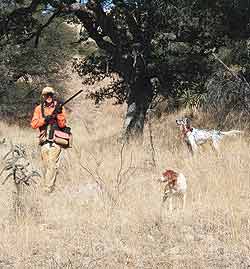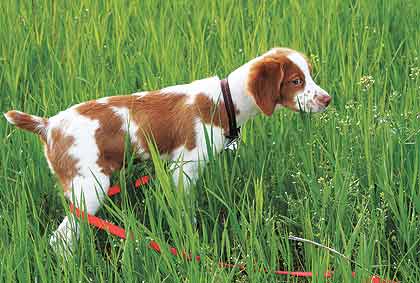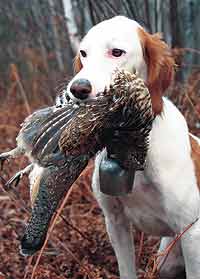Some of the old truisms just are not true
By Dave Carty
 As a general rule, hunting a young dog with an older dog won't teach it to hunt. The dog needs to learn to hunt on its own. |
When the guy found out I was training dogs on the side, he gave me a call. Could I handle a problem his dog was having? Since I work with just a couple of dogs each summer, I was already booked, but I told him I'd be happy to talk if he wanted to drive out for visit. He showed up right on schedule.
As it turned out, his dog's problem wasn't much of an issue, and in a few minutes we got into a rambling conversation about bird dogs and hunting. I'll talk dogs and hunting with anybody--just try to shut me up--and it was obvious this guy knew the game. A half hour later, he sighed. There was something else. His older dog was on the way out, he let on, and wouldn't be able to "train" his new puppy to hunt.
I must have seemed dubious, so he explained himself. Seems his dad had raised German shorthairs for years, and new pups had always been run in the field behind his older dogs, learning to hunt in the process.
I'm a little brighter than I look (although that will undoubtedly amaze some of you), so I bit my tongue. But I couldn't help thinking, where was your dad's GSP when I needed my last dog trained?
Actually, that's not what I thought. I've seen dogs learn to raid garbage cans, bark for hours on end, and crap on the bed, all, I assume, by watching other dogs get away with that type of behavior, but I've yet to see a dog learn to find birds, hunt to objectives, point, back, retrieve, come when called, whoa, heel or do anything else constructive from hunting with other dogs. It's a nice fantasy, but it just doesn't work that way.
On the other hand, occasionally running a younger dog with an experienced older dog can have some benefits, especially if it's limited to a few days at the beginning of the season. The older dog will find the birds, and in the process the youngster begins associating certain types of cover with bird scent. But at that point it's time to let the pup hunt by himself.
He needs to develop the drive to hunt on his own, and keeping him in the field with an older dog runs the risk of making him dependent upon the other animal. If a youngster shows me drive and initiative on his own, I typically won't hunt him with an older dog at all until his second season.
Still, it's an enduring myth--that a pup will learn to hunt by hunting with an older dog--and it persists even among experienced hunters, like the guy I was talking to that day in my living room.
And so it goes. I'm not sure how these ideas got started, but I suspect it has something to do with how much we invest in believing they're true. As with politics and religion, what you believe often determines how you interpret the world. But wait, it's a bit subtler than that--some of these myths have a grain of truth.
You've all done this--thrown a rolled-up sock for your ten-week-old puppy to retrieve. Here's what happens: the puppy gallops out, pounces on it, and brings it back to you, wiggling with excitement. The theory is that you're building on your pup's natural retrieving ability, which down the road will translate into retrieving in the field. You're happy and the puppy is happy. So what's not to like?
 Precocious puppies are great--but don't give up on slow learners. |
Not a thing. But as the dog grows older, his desire to retrieve seems to fade, then blink out all together. What happened? He was doing so well!
What happened is that the dog's primary instincts took center stage. In this day and age, most pointers are bred for nose and drive, not retrieving ability. That's not true of all the breeds--I'm impressed with the strong retrieving instincts of griffons and wirehairs, for instance--but among English pointers, setters, Brittanys, and a good many GSPs, a strong desire to retrieve is a happy aberration, not standard equipment. That some dogs do develop into natural retrievers is due to the dog's instincts, and the credit should go to the breeder, not the sock drill.
Don't get me wrong. I'm not suggesting that you abandon the rolled-up sock exercise; it's fun and I do it with all my new puppies, figuring it's one more helpful step in the socialization process. Maybe I also keep hoping that, just once, I won't have to go through the force-breaking drill, that this youngster will be the exception to the rule. So far, that hasn't happened. Force breaking--as unpleasant as it sometimes is--is the answer. Which segues into the next enduring myth: Does force breaking ruin a dog's natural retrieving ability? Assuming your dog does, in fact, have a natural drive to retrieve (see my comments above) I have a three-word answer for that: professional retriever trainers.
I've interviewed dozens of pro retriever trainers over the years, and spoken with dozens more. I've talked to them at the handful of retriever trials I've attended, and can count a half dozen serious amateur trainers as friends. I can't remember the last trainer I met who didn't force-break his dogs. I'm not saying they don't exist--I'm sure they do--only that I haven't met one in years.
Why would that be? Labrador retrievers have the strongest drive to retrieve of any dogs in the world. Even a mediocre Lab will retrieve everything you shoot until he drops dead from exhaustion, whether he's been force broken or not. Why run the risk of ruining his drive? Because (1), in the retriever game, it's all about control, and (2), with regard to retrievers and pointers both, the risk of "ruining" his drive is highly overrated.
In fact, among the pointers I've force broken or seen force broken by competent trainers, their drive to retrieve has almost always increased. Granted, not always by a lot. My setter, Scarlet, would be perfectly happy letting other dogs retrieve her birds for the rest of her life, but when I command her to pick up a bird I've shot, she's happy to do it. Contrast that to before I force broke her, when she had no desire to retrieve whatsoever.
 Done correctly, force breaking won't lessen your dog's enthusiasm to retrieve. |
On the other hand, there's one thing that force breaking won't do, in my limited experience: cure hardmouth. I can't tell you how it works with retrievers, but pointing dogs with this problem are fairly common; I've owned a couple myself, including my youngest setter, Hanna. So far, force breaking hasn't helped Hanna and it didn't help the other one, either.
I don't have a broad base of experience with this, however, although most of the claims I've heard otherwise come not from pointing dog trainers, but from retriever trainers, in whose dogs hardmouth is apparently less common. In point of fact, I haven't found a solution. I've tried frozen birds, a leather harness with steel spikes (on a pigeon, not me), nicks from a shock collar, verbal reprimands, you name it.
About the only thing I've found that occasionally seems to work is to be standing next to the dog when it picks up a wounded bird, making sure it doesn't chew it, but that has proved difficult to do on any kind of consistent basis. So for the time being I'm still searching for a technique. You'll hear when I get it figured out.
I suspect the inclination toward hardmouth is something a dog is born with or later learns on his own, not necessarily something you create inadvertently through training. Chomping down on a struggling game bird is a natural reaction among pointing dogs; if he chomps down hard enough he kills the bird and, at least from his perspective, solves the problem.
Like almost everyone, I spent years believing that playing tug-of-war with a dog would develop hardmouth problems later on, but now I'm not so sure. Throw a towel into a pen full of puppies and you'll have a couple of them playing tug-of-war in two minutes or less. Do they develop a hard mouth because of that behavior? Maybe, maybe not.
I also know at least one retriever trainer who deliberately plays tug-of-war when his dogs return a bumper he's thrown. He thinks it encourages them to return the bumper to hand, and he may be on to something. I've hunted over his dogs and none have hardmouth problems that I can see.
How many of you have been told that pointing dogs should be taught to quarter? One of the goals of my life, along with shooting a perfect score at my sporting clays club, dancing like Gene Kelly, and keeping my preternaturally good looks until I'm 100, is to convince people that pointing dogs don't need to quarter. Spaniels, retrievers€¦they quarter, but good pointing dogs hunt to objectives, which they'll do all by their happy little selves if you get out of the way and let them.
That means they'll learn where the birds live through the process of trial and error, not through some mechanical windshield-wiper pattern you've drilled into them. If you so desire, you can direct them to better cover by whistling to get their attention, then walking toward the cover with your arm out and pointing in that direction. I do just that with my own dogs.
If they find birds, they get the gist of what I want in surprisingly short order. No, this doesn't teach them to take hand signals like a Lab, but it works well enough. Failing that, you can just let your dogs figure things out on their own. They will.
Finally, who isn't thrilled to watch his 10- or 12-week-old puppy stick a planted pigeon and hold point for 45 seconds? Does this mean that puppy has tremendous potential and the makings of a great bird dog? Really?
You bet it does. Every time I see a pup using his nose like a much older dog and solidly pointing a planted bird, I want to jump in the air and shout hallelujah. But here's the flip side: puppies that don't point at that age have just as much chance to develop into great bird dogs as do the child prodigies.
Like kids, puppies mature at their own pace, and some, like my setter Scarlet, don't point much of anything until they're several months old. My general rule is that as long as a youngster is excited and showing some natural curiosity--hunting, in other words--you've got nothing to worry about. Sooner or later, he'll start pointing birds, and given enough field time and bird work, has every bit as much potential to develop into a bragging-rights dog. But a dog with little drive to hunt at seven or eight months of age, despite repeated exposure to planted birds, might not have what it takes, although even then I've seen dogs turn the corner. Fortunately, low-desire dogs from reputable kennels are rare.
It occurred to me while I was writing this that, as sure as the sun rises in the east, someone will prove one of these myths true after all, at least to his satisfaction. So be it. God knows I've had my opinions shot down before. But before you send me a poison pen letter in care of the editor of this magazine, who despite his protests to the contrary really loves to hear from irate readers [Editor's note: NOT!], take a moment to reflect on how your dog got to where he is. I like to think of it this way: What have I really taught my dogs, and what have they learned in spite of me?






